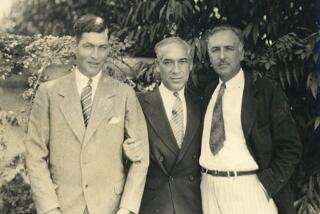Murder on the rez: A phenomenal thriller invents Native noir — and then transcends it
If you buy books linked on our site, The Times may earn a commission from Bookshop.org, whose fees support independent bookstores.
“Winter Counts” is a once-in-a-generation thriller, an unforgettable debut set in and around South Dakota’s Rosebud Indian Reservation that brims with complex characters, believable conflicts and an urgent message about Native culture, inequities and criminal justice. The propulsive story of Virgil Wounded Horse, a mixed-blood (or iyeska) enforcer who battles the influx of drugs into the RIR, it’s also, according to its author, David Heska Wanbli Weiden, one of only a handful of thrillers by an Indigenous author.
Before fans race to their keyboards to defend their favorite Native-themed mysteries, it’s important to understand that Weiden knows what he’s talking about. Denver-born and -raised, he’s an enrolled citizen of the Sicangu Lakota Nation. His family’s ancestral home is on the RIR; it’s where his Lakota mother grew up, where family members served in tribal leadership and where Weiden returns to visit family and take part in Native spiritual ceremonies. (His spirit name, Heska Wanbli, bestowed in a Lakota ceremony similar to one movingly depicted in “Winter Counts,” roughly translates to “mountain eagle.”)
If that ancestry doesn’t lend a deeper level of authenticity to Weiden’s portrayal of Native life, consider his own journey: a mixed-blood child, like Virgil Wounded Horse, who was bullied by schoolmates in Elyria-Swansea, a Denver neighborhood with no local library — driving Weiden to read “everything I could get my hands on” from a bookmobile.
Weiden’s bookishness led him to a JD degree and a legal career, which provided economic security, but he found his calling while teaching a criminal justice course to first-generation college students like himself, many of color. Weiden eventually discovered writing, enrolling in Vermont College of Arts’ MFA program and later the Institute of American Indian Arts in Santa Fe, whose prominent graduates include U.S. Poet Laureate Joy Harjo and novelist Tommy Orange. There his voracious reading included Native authors like Adrian C. Louis, Louise Erdrich, Linda Hogan and even Martin Cruz Smith, whose Pueblo descent is reflected an early speculative novel. Weiden also read Louis Owens and Stephen Graham Jones, two of the few Natives who write crime fiction.
In Stephen Graham Jones’ “The Only Good Indians,” four hunters make a wasteful kill; a decade later, they pay a bloody price.
In conversation, it becomes clear that Weiden’s background — including his position teaching politics, law and Native American studies at Metropolitan State University — made his authorship of an elevated Native crime novel as inevitable as the sunrise. “Natives are quite familiar with the inequities in the criminal justice system,” he says.
Last fall, Weiden published an award-winning middle-school biography of Chief Spotted Tail, a peace-loving Lakota chief who refused to fight in an 1860s Indian war against the U.S. It was the prosecution of Spotted Tail’s murderer, and the ensuing jurisdictional battle between the Lakota and the federal government, that led to the passage of the Major Crimes Act in 1885, which to this day limits Native people from prosecuting serious felonies on their own lands.
Only federal officials have that authority, and they don’t often use it. “The feds are declining a large number of these cases,” Weiden says ruefully, “even when the offender has been arrested.” In the wake of a recent Supreme Court ruling designating much of Eastern Oklahoma as Indian country, Weiden wrote an essay on unequal justice for Native people, especially women, under the Major Crimes Act, which he believes should be reexamined if not abolished altogether.
Until then, deeply flawed policy can make for compelling noir, as well as a thoughtful consideration of the limits of vigilantism. Armed with his brass knuckles, baseball bat and assorted implements of mayhem, Virgil Wounded Horse — based on real people Weiden has encountered — metes out punishment on behalf of Lakota victims and their families with no real legal recourse. The novel opens with him beating Coach Guv Yellowhawk, accused of molesting several children at the local school, within an inch of his life. “I’d waived my fee for this job,” Virgil says. “Usually I charged a hundred bucks for each tooth I knocked out and each bone I broke, but I decided to kick Guv’s ass for free.” Though Virgil is for hire, he’s also initially out for revenge against those, like Yellowhawk, who terrorized him for being iyeska.
S.A. Cosby’s “Blacktop Wasteland” stakes out territory in undersung places — and sings too of the complex lives of Black men.
As readers learn more about Virgil’s family tragedies, it also becomes clear that he’s in search of spiritual and communal healing, which prompts him to take another case: eradicating a Denver gang that’s introducing heroin onto the rez. Many characters in “Winter Counts” are deeply in need of healing. There’s Virgil’s rap-loving nephew Nathan, a teenager still reeling from the death of his mother in a car accident. Virgil’s best friend Tommy, nicknamed Ik-Tommy after the trickster spider-man of Lakota lore, is searching for a sense of purpose after doing two years in state prison for defending himself against a group of Rapid City, S.D., college boys. And then there’s Virgil’s ex-girlfriend, Marie Short Bear. Daughter of a wealthy tribal leader, she chafes under a family mandate that she attend a western medical school instead of pursuing her growing interest in more holistic methods to improve the health of her community.
As specific as these issues seem to the Lakota Nation, Weiden has a broader audience in mind. “I hope these themes are universal and people can relate to the struggle that each of the characters face,” he says, “their struggles to figure out, ‘Do I fit in here? Are they accepting me?’”
“Winter Counts” — whose title refers to a calendar system used by the Lakota — is also rich in references to a wide range of Native cultural icons: Vine Deloria Jr. the Indian historian and theologian; indigenous L.A. designer B. Yellowtail; visual artist James Luna; and — in a substantial subplot — a fictional indigenous chef whose quest to reintroduce people to their traditional foodways pays homage to rising Native chefs in Northern California and beyond.
Virgil Wounded Horse’s world is so fascinating that it’s a bit shocking when Weiden tells me the idea almost died before it was born; in an early short story, he killed Virgil off. “I thought that I was done with him,” he says with a laugh, “but over the next two or three years, his character kept returning to me. I realized I hadn’t explored him enough, there was so much left to tell.”
By turning that story into a crime novel, Weiden challenges the genre’s boundaries by including historical and cultural references as well as elements of magical realism. “If I can build on what Louis Owens and Stephen Graham Jones have done,” he says, “in creating a template for what indigenous crime fiction can be, then I’d feel I’ve done justice to those who came before me.”
Mi-Ae Seo’s chilling homage to ‘Silence of the Lambs’ joins a burgeoning genre.
As much acclaim as Weiden has received for pushing beyond the traditional mystery — glowing prepublication reviews and full-throated endorsements from Erdrich and Orange as well as Western mystery writers like Craig Johnson and CJ Box — the feedback that matters most to him comes from Sicangu Lakota members. “They told me that they were so deeply moved that they are reclaiming their own Lakota spirituality. And that’s exactly what I wanted to do, depict [Lakota culture] in a positive way that would do some good in the world.”
More to Read
Sign up for our Book Club newsletter
Get the latest news, events and more from the Los Angeles Times Book Club, and help us get L.A. reading and talking.
You may occasionally receive promotional content from the Los Angeles Times.







